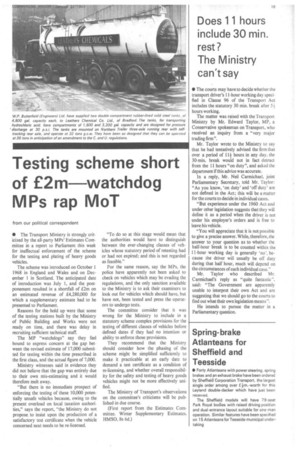Testing scheme short of £2m watchdog MPs rap MoT
Page 21

If you've noticed an error in this article please click here to report it so we can fix it.
from our political correspondent • The Transport Ministry is strongly criticized by the all-party MPs' Estimates Committee in a report to Parliament this week for ineffectual enforcement of the scheme for the testing and plating of heavy goods vehicles.
The scheme was introduced on October 1 1968 in England and Wales and on December 1 in Scotland. The anticipated date of introduction was July 1, and the postponement resulted in a shortfall of £2m on an estimated revenue of £4,280,000 for which a supplementary estimate had to be presented to Parliament.
Reasons for the hold up were that some of the testing stations built by the Ministry of Public Building and Works were not ready on time, and there was delay in
recruiting sufficient technical staff.•The MP "watchdogs" say they feel
bound to express concern at the gap between the revised estimate of 17,000 submitted for testing within the time prescribed in the first class, and the actual figure of 7,000.
Ministry witnesses said in evidence they did not believe that the gap was entirely due to their own mis-estimating and it would therefore melt away.
"But there is no immediate prospect of enforcing the testing of these 10,000 potentially unsafe vehicles because, owing to the present overload on local taxation authorities," says the report, "the Ministry do not propose, to insist upon the production of a satisfactory test certificate when the vehicle concerned next needs to be re-licensed. "To do so at this stage would mean that the authorities would have to distinguish between the ever-changing classes of vehicles whose statutory period of retesting had or had not expired; and this is not regarded as feasible."
For the same reason, say the MPs, the police have apparently not been asked to check on vehicles which may be evading the regulations, and the only sanction available to the Ministry is to ask their examiners to look out for vehicles which should have, but have not, been tested and press the operators to undergo tests.
The committee consider that it was wrong for the Ministry to include in a statutory scheme complex provisions for the testing of different classes of vehicles before defined dates if they had no intention or ability to enforce those provisions.
They recommend that the Ministry should consider how the phasing of the scheme might be simplified sufficiently to make it practicable at an early date to demand a test certificate as a condition of re-licensing, and whether overall responsibility for the safety and testing of heavy goods vehicles might not be more effectively unified.
The Ministry of Transport's observations on the committee's criticisms will be published in due course.
(First report from the Estimates Committee. Winter Supplementary Estimates, HMSO, 8s 6d.)




































































































